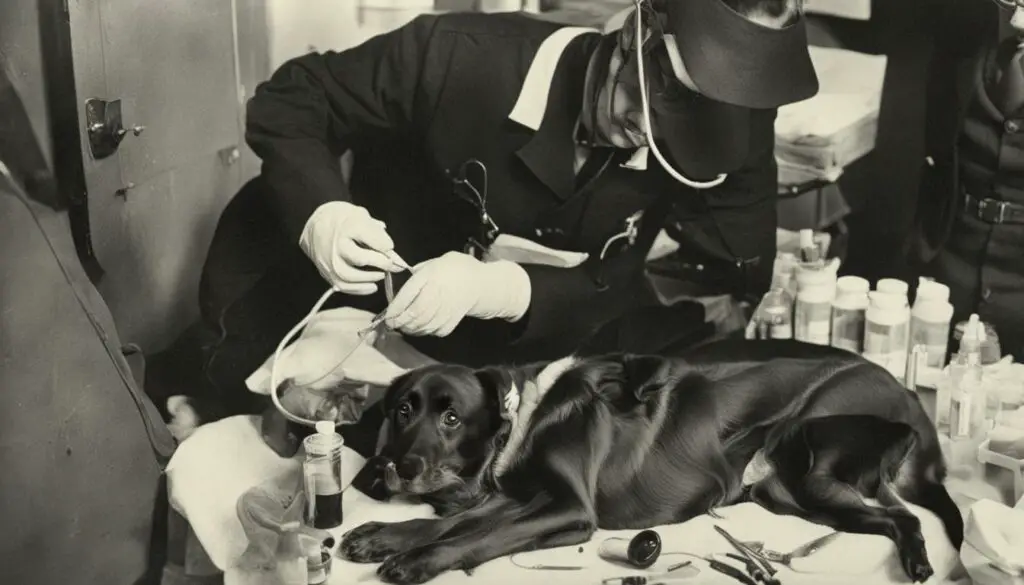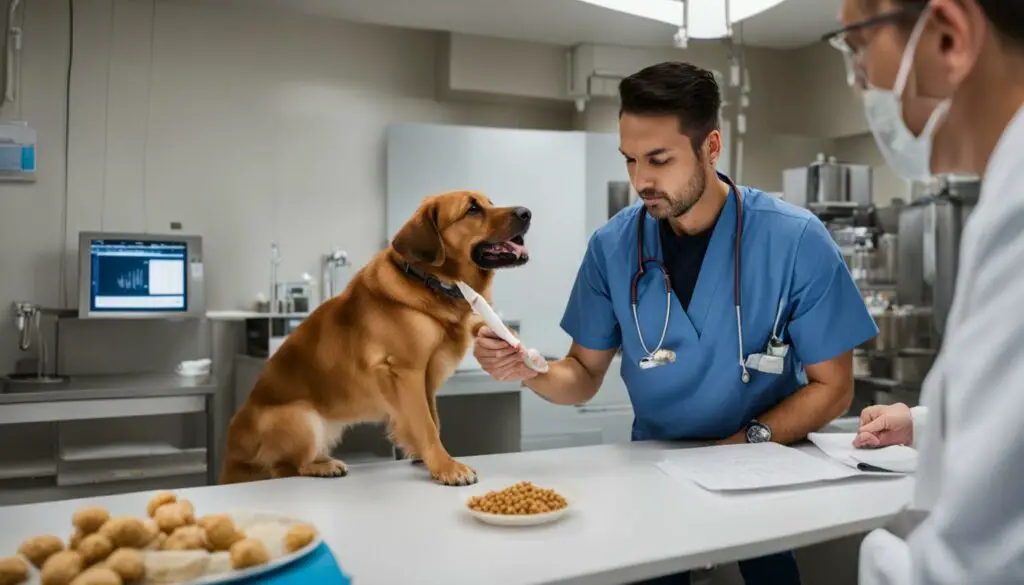As a dog owner, I know how curious and mischievous our furry friends can be. One moment they’re sniffing around the kitchen counter, and the next, they’ve managed to snatch a raisin. While raisins may seem harmless to us, they can actually pose a serious health risk to dogs. In this article, we’ll explore why dogs should avoid eating raisins, the potential dangers they can pose, and what you should do if your dog accidentally ingests one.
Can dogs eat raisins? The short answer is no. Even a single raisin can potentially lead to kidney failure in dogs. It’s important to understand the risks and take immediate action to protect your dog’s health. Whether your dog ate one raisin or a handful, it’s crucial to treat the situation seriously.
Key Takeaways:
- Raisins can be toxic to dogs and may lead to kidney failure.
- Even a single raisin can be dangerous, so prompt action is necessary.
- Prevention is key – keep raisins and grape-containing products out of your dog’s reach.
- If your dog ingests a raisin, contact your veterinarian or a pet poison control center immediately.
- Early diagnosis and treatment can significantly improve your dog’s chances of recovery.
Types of Grapes and Raisins that are Toxic to Dogs
When it comes to grapes and raisins, not all varieties are created equal in terms of toxicity to dogs. It’s important to be aware of the types of grapes and raisins that can be harmful to our furry friends. While there are no specific varieties of grapes that are safe for dogs to consume, it’s best to err on the side of caution and avoid all types.
Grapes:
Both seeded and seedless grape varieties can be toxic to dogs. Whether they are red or green, it doesn’t matter – all grapes pose a risk. This includes commercially grown grapes, homegrown grapes, and even grape pressings from wineries. It’s important to keep in mind that grape jellies, grape juice, and wine do not appear to be a toxicity concern. However, it’s always best to avoid giving these products to your dog to be safe.
Raisins and Currants:
Raisins and currants are dried versions of grapes, and they can be just as dangerous for dogs. Any food that contains raisins, such as raisin bran cereal, trail mix, granola mix, or baked goods like raisin bread or oatmeal raisin cookies, can be poisonous to dogs. It’s crucial to read ingredient labels carefully and avoid feeding your dog any foods that contain raisins or currants.
Remember, it’s better to be safe than sorry. Always keep grapes, raisins, and foods containing these fruits out of your dog’s reach to prevent any potential harm.

| Type of Grape/Raisin | Toxicity to Dogs |
|---|---|
| Seedless Grapes | Highly toxic |
| Seeded Grapes | Highly toxic |
| Commercially Grown Grapes | Highly toxic |
| Homegrown Grapes | Highly toxic |
| Grape Pressings from Wineries | Highly toxic |
| Grape Jellies, Grape Juice, and Wine | Not considered toxic |
| Raisins and Currants | Highly toxic |
Toxic Dose of Grapes and Raisins for Dogs
When it comes to the toxic dose of grapes and raisins for dogs, there is no well-established threshold. However, it is important to note that dogs are more likely to experience poisoning if they ingest larger amounts of these fruits. While some dogs may exhibit sensitivity even to small doses, others may consume a few grapes or raisins without any apparent consequences. Therefore, it is crucial for pet owners to take any exposure to grapes or raisins seriously and seek immediate veterinary care.

Toxicity can vary from dog to dog, making it difficult to determine a specific toxic dose. It is always better to err on the side of caution and avoid giving grapes or raisins to your furry friend altogether. Even a small amount of these fruits can be detrimental to a dog’s health, as they can lead to kidney failure and other serious complications.
| Toxic Dose of Grapes | Toxic Dose of Raisins |
|---|---|
| Dogs may show sensitivity to small amounts of grapes. | Even a single raisin can be toxic to some dogs. |
| Some dogs can consume a few grapes without any obvious ill effects. | It is vital to seek veterinary care if your dog ingests any amount of raisins. |
| Large quantities of grapes can pose a significant risk, especially in smaller dog breeds. | The potential toxicity of raisins is not dependent on the dog’s size or breed. |
Remember, every dog is unique, and the severity of the toxic effects can vary. It is always better to be safe than sorry when it comes to the health and well-being of your beloved pet. If your dog has ingested grapes or raisins, do not hesitate to contact your veterinarian immediately for guidance and treatment.
The Toxicity of Grapes, Raisins, and Currants to Dogs
Grapes, raisins, and currants can pose a significant threat to dogs, and it is important for pet owners to understand why these fruits are toxic. While the exact toxic substance in grapes and raisins is still unknown, it is clear that these fruits can cause acute kidney failure in dogs. Despite the lack of a specific toxic agent, any exposure to grapes, raisins, or currants should be taken seriously.
There have been speculations about potential causes of the toxicity, such as mycotoxins, salicylate drugs, or tartaric acid. However, research has not yet identified the precise reason behind the toxic effects. Regardless of the exact mechanism, it is crucial to keep grapes, raisins, and currants away from dogs to prevent any potential harm.
Toxicity can occur in dogs that consume various types of grapes and raisins, including seedless or seeded varieties, commercial or homegrown grapes, and red or green grapes/raisins. It is not just fresh grapes that pose a risk; foods such as raisin bran cereal, trail mix, granola mix, and baked goods containing these fruits can also be poisonous to dogs.
| Type of Grape/Raisin | Potential Toxicity |
|---|---|
| Seedless or seeded grapes | Poisonous |
| Commercial or homegrown grapes | Poisonous |
| Red or green grapes/raisins | Poisonous |
| Grape pressings from wineries | Poisonous |
| Grape jellies, grape juice, and wine | No apparent toxicity concern |
It is important to be cautious and prevent dogs from accessing these potentially harmful fruits. Immediate veterinary attention should be sought if a dog ingests grapes, raisins, or currants to prevent any complications and ensure the well-being of your beloved pet.
Immediate Steps to Take If Your Dog Eats Grapes or Raisins
If you suspect that your dog has eaten grapes or raisins, it is crucial to take immediate action to protect their health. Here are the steps you should follow:
- 1. Contact your veterinarian or a pet poison control service immediately: It is essential to seek professional guidance as soon as possible. They will provide you with specific instructions based on your dog’s size, the amount of grapes or raisins ingested, and any existing health conditions.
- 2. Do not induce vomiting unless instructed by a professional: While inducing vomiting can help remove the ingested grapes or raisins, it is not recommended without professional guidance. Some situations may call for immediate vomit induction, while others may require specific treatments or decontamination methods.
- 3. Be prepared to provide important information: When contacting your veterinarian or pet poison control service, be ready to provide details such as your dog’s weight, the type and quantity of grapes or raisins consumed, and the time of ingestion. This information will help them assess the situation and provide appropriate guidance.
- 4. Follow the recommended treatment guidelines: Your veterinarian or the pet poison control service will guide you on the next steps, which may include decontamination procedures, administration of activated charcoal, intravenous fluids, and other necessary medications. It is crucial to follow their instructions precisely for the best possible outcome.
Remember, time is of the essence when it comes to grape or raisin ingestion. Acting promptly and seeking professional help can significantly reduce the risks and potential complications for your beloved pet.

Symptoms of Grape or Raisin Toxicity in Dogs
If your dog has ingested grapes or raisins, it is essential to be aware of the symptoms that may indicate toxicity. Early recognition of these signs can prompt you to seek veterinary help immediately, potentially saving your dog’s life.
The most common early symptom of grape or raisin toxicity in dogs is vomiting, which typically occurs within 24 hours of ingestion. Additionally, dogs may exhibit a lack of appetite, lethargy, and diarrhea within the next 12-24 hours.
As the toxicity progresses, more severe symptoms may manifest. These can include nausea, diarrhea, abdominal pain, excessive thirst, excessive urination, and uremic breath. Kidney failure, a potential consequence of grape or raisin ingestion, can lead to a significant increase in blood pressure and even coma.
Recognizing the Symptoms
The symptoms mentioned above can vary in severity depending on the amount of grapes or raisins consumed and the individual dog’s sensitivity. It is important to remain vigilant and note any changes in your dog’s behavior or health after potential exposure to these fruits.
If you observe any of these symptoms or suspect that your dog has ingested grapes or raisins, it is crucial to contact your veterinarian or a pet poison control service immediately. Prompt diagnosis and treatment can significantly improve the chances of a positive outcome for your furry friend.
| Symptoms of Grape or Raisin Toxicity in Dogs |
|---|
| Vomiting within 24 hours of ingestion |
| Lack of appetite, lethargy, and diarrhea within 12-24 hours |
| Nausea, diarrhea, abdominal pain, excessive thirst, excessive urination, and uremic breath |
| Severe symptoms may indicate kidney failure |
Diagnosing Grape/Raisin Poisoning in Dogs
When a dog ingests grapes or raisins, prompt diagnosis is essential to ensure timely treatment and protect the dog’s health. While there is no specific test to definitively diagnose grape/raisin poisoning, veterinarians rely on a combination of factors to make an accurate assessment.
H3: History and Clinical Signs
The veterinarian will begin by gathering a thorough history, including any known ingestion of grapes or raisins. The owner should provide details such as the type of grape/raisin ingested, the amount consumed, and the time since ingestion. The veterinarian will also examine the dog for any clinical signs associated with grape/raisin toxicity, such as vomiting, diarrhea, lethargy, or changes in urination patterns.
H3: Diagnostic Tests
To evaluate kidney function and determine the dog’s likelihood of recovery, the veterinarian may perform several diagnostic tests. A complete blood count (CBC) can provide information about red and white blood cell counts, as well as platelet levels. A serum biochemistry profile measures kidney function, electrolyte levels, and liver enzymes. Additionally, a urinalysis can help assess kidney damage and identify any abnormalities.
H3: Additional Considerations
In some cases, the veterinarian may recommend further tests, such as abdominal imaging or urine protein-to-creatinine ratio, to assess the extent of kidney damage. These tests can provide valuable information about the dog’s overall condition and guide the treatment plan. It’s important for dog owners to follow the veterinarian’s recommendations and provide any necessary follow-up care or monitoring.
| Diagnostic Procedures for Grape/Raisin Poisoning in Dogs | Advantages | Disadvantages |
|---|---|---|
| Complete Blood Count (CBC) | Provides information about red and white blood cell counts, platelet levels | Does not directly measure kidney damage |
| Serum Biochemistry Profile | Measures kidney function, electrolyte levels, liver enzymes | Does not provide a definitive diagnosis |
| Urinalysis | Assesses kidney damage, identifies abnormalities | May not detect early-stage kidney damage |
| Abdominal Imaging | Assesses extent of kidney damage | May require sedation or anesthesia |
| Urine Protein-to-Creatinine Ratio | Provides additional information about kidney function | May not be available at all veterinary clinics |
By combining the dog’s history, clinical signs, and diagnostic test results, veterinarians can accurately diagnose grape/raisin poisoning and develop an appropriate treatment plan. It is crucial for dog owners to seek veterinary help as soon as possible if they suspect their dog has ingested grapes or raisins, as early intervention can greatly improve the dog’s prognosis.

Treatment for Grape/Raisin Poisoning in Dogs
In the unfortunate event that your dog ingests grapes or raisins, prompt and appropriate treatment is crucial to prevent further harm and protect their well-being. There are several treatment options available to address grape/raisin toxicity in dogs:
Decontamination:
Decontamination is the first step in treating grape/raisin poisoning. This may involve inducing vomiting under veterinary supervision to expel the ingested grapes or raisins from your dog’s system. Activated charcoal may also be administered to prevent further absorption of the toxins into the bloodstream.
Intravenous Fluids:
Intravenous fluids play a vital role in treating grape/raisin poisoning as they help support and protect the kidneys. Hydration is crucial for flushing the toxins from the body and minimizing kidney damage. Your veterinarian will monitor and adjust fluid therapy based on your dog’s condition.
Medications and Supportive Care:
In addition to decontamination and intravenous fluids, your veterinarian may prescribe medications to control nausea, maintain proper blood flow to the kidneys, and regulate blood pressure. These medications can help alleviate symptoms and further protect your dog’s organs. Supportive care, including close monitoring and regular blood tests to assess kidney function, will be necessary throughout the treatment process.
It’s important to note that the treatment for grape/raisin poisoning in dogs may vary depending on the severity of the ingestion and the individual dog’s condition. Your veterinarian will create a personalized treatment plan based on your dog’s specific needs and response to treatment.

| Treatment Options | Explanation |
|---|---|
| Decontamination | Inducing vomiting and administering activated charcoal to remove the toxins from the body. |
| Intravenous Fluids | Providing fluids intravenously to support kidney function and promote hydration. |
| Medications and Supportive Care | Prescribing medications to alleviate symptoms and protect organ function, along with close monitoring and regular blood tests. |
Remember, it is crucial to seek veterinary help immediately if your dog ingests grapes or raisins. Do not attempt to treat your dog at home without professional guidance. Early intervention and appropriate treatment can significantly improve your dog’s chances of recovery.
Prognosis and Outlook for Dogs with Grape/Raisin Poisoning
When it comes to dogs that have ingested grapes or raisins, the prognosis and outlook depend on various factors. These factors include the amount ingested, the timeliness of treatment, the presence of kidney failure, and the dog’s response to therapy. If a dog receives immediate treatment after ingesting a small amount of grapes or raisins, the prognosis is generally excellent. However, if kidney damage has already occurred, the outlook may be more concerning, and euthanasia may be considered to prevent further suffering.
Regular follow-up with a veterinarian is crucial to monitor kidney function and the overall recovery of a dog that has experienced grape or raisin poisoning. By closely monitoring the dog’s progress, veterinarians can make any necessary adjustments to treatment plans and provide ongoing support for the dog’s health and well-being.

| Factors Affecting Prognosis | Predicted Outcome |
|---|---|
| Immediate treatment after ingestion of small amount | Excellent prognosis |
| Kidney damage already present | Poor prognosis, euthanasia may be considered |
| Regular follow-up and monitoring by a veterinarian | Allows for adjustments to treatment and ongoing support for the dog’s health |
“The prognosis for dogs with grape or raisin poisoning can vary significantly depending on the individual case. It is important to seek immediate veterinary help and closely follow their guidance for the best possible outcome.”
In summary, the prognosis for dogs with grape or raisin poisoning can range from excellent to poor, depending on the specific circumstances. Immediate treatment, regular follow-up with a veterinarian, and ongoing monitoring of kidney function are vital for ensuring the best possible outcome for the affected dog. By taking prompt and proactive measures, pet owners can increase the chances of a successful recovery and safeguard their beloved furry companions’ long-term well-being.
Preventing Dogs from Eating Grapes and Raisins
Ensuring that your dog doesn’t have access to grapes and raisins is crucial for their safety and well-being. These fruits can be highly toxic to dogs, leading to serious health complications such as kidney failure. To prevent your dog from ingesting grapes and raisins, follow these important steps:
- Keep grapes and raisins out of reach: Store grapes and raisins in secure locations that are inaccessible to your dog. This includes countertops, tables, and pantry shelves. Remember, dogs are curious creatures and will often explore their surroundings in search of something tasty.
- Avoid sharing food with grapes or raisins: While it may be tempting to share your food with your furry friend, certain foods can be harmful to dogs. Be mindful of dishes that may contain grapes or raisins, such as salads, baked goods, and trail mixes. Always double-check ingredients before sharing food with your dog.
- Inform family members and visitors: Educate your family members, as well as any visitors to your home, about the dangers of grapes and raisins for dogs. Encourage everyone to be cautious when handling these fruits and to dispose of any leftovers properly.
- Be aware of other toxic foods: Grapes and raisins are not the only foods that can be harmful to dogs. Onions, garlic, chocolate, alcohol, and foods containing the sugar alcohol sweetener xylitol are also dangerous. Familiarize yourself with a comprehensive list of toxic foods and keep them away from your dog.

“Preventing your dog from ingesting grapes and raisins is crucial for their safety and well-being.”
By following these preventive measures, you can significantly reduce the risk of your dog ingesting grapes and raisins, ensuring their health and happiness. Remember, even a small amount of these fruits can have severe consequences for your furry friend, so it’s essential to remain vigilant and take proactive steps to keep them safe.
Risks of Grape/Raisin Toxicity in Other Animals
Raisins and grapes can have toxic effects on dogs, but what about other animals? While grape and raisin toxicity is a well-known danger for dogs, there is limited information on the effects of these fruits in other pets. It is important to note that the toxic effects of grapes and raisins have only been identified in dogs. Other animals may not exhibit the same level of susceptibility to the toxic compounds found in these fruits.
Research on the toxicity of grapes and raisins in other animals is still ongoing, but it is advisable to avoid giving these fruits to any pet as a precautionary measure. Although the specific toxic agent in grapes and raisins is not yet known, it is better to err on the side of caution and refrain from exposing other animals to these potentially harmful fruits.
While there may not be concrete evidence of grape or raisin toxicity in other animals, it is always best to consult with a veterinarian before introducing any new foods into your pet’s diet. Each animal species can have different sensitivities and react differently to various substances, so it is crucial to prioritize their safety and well-being.

Summary:
Grape and raisin toxicity is primarily a risk for dogs, and there is limited data on the effects of these fruits in other animals. While other animals may not be affected in the same way as dogs, it is advisable to avoid giving grapes and raisins to any pet as a precautionary measure. Research is ongoing to better understand the potential toxicity of these fruits in other animals, but in the meantime, it is essential to prioritize your pet’s safety and consult with a veterinarian before introducing new foods into their diet.
Importance of Seeking Veterinary Help for Grape/Raisin Poisoning
If your dog has ingested grapes or raisins, it is crucial to seek veterinary help immediately. Early diagnosis and treatment can significantly improve your dog’s chances of recovery. Contact your veterinarian or a pet poison control center for guidance and follow their instructions for the best possible outcome.
Grape and raisin poisoning in dogs can lead to serious health complications, including acute kidney failure. As responsible pet owners, it is our duty to prioritize our dog’s well-being and take immediate action when faced with a potential poisoning situation.
When it comes to grape/raisin ingestion, time is of the essence. The sooner your dog receives veterinary intervention, the better the chances of minimizing the absorption of toxins and preventing kidney damage. Remember, even a small amount of grapes or raisins can be harmful to your dog, so it is important not to underestimate the situation.
Understanding the Dangers of Raisins for Dogs
Raisins, whether fresh or dried, can pose serious health risks to dogs. Even a small amount of raisin ingestion can lead to detrimental effects on their kidneys, potentially resulting in kidney failure and even death. It is crucial for dog owners to be aware of these dangers and take proactive measures to prevent their furry friends from consuming raisins.

One of the main risks associated with raisin ingestion is the toxicity it poses to dogs. The exact substance in raisins that causes harm to dogs is still unknown, but even a single raisin can trigger a severe reaction. Dogs may experience symptoms such as vomiting, diarrhea, lack of appetite, increased thirst, and lethargy. These symptoms can progress rapidly, leading to acute kidney failure, a life-threatening condition.
It’s important to note that the toxicity of raisins can vary from one dog to another. Some dogs may exhibit severe symptoms after consuming just a few raisins, while others may not display any adverse effects. However, it is crucial to understand that no amount of raisin ingestion should be taken lightly, and immediate veterinary care should be sought if there is any suspicion of raisin consumption.
To protect your dog from the dangers of raisins, it is essential to keep all raisin-containing foods out of their reach. This includes not only whole raisins but also foods that may contain raisins as an ingredient, such as trail mix, baked goods, and cereals. Additionally, be sure to educate family members and guests about the risks of raisins to ensure they do not unknowingly share these dangerous treats with your dog.
| Risks of Raisin Ingestion in Dogs |
|---|
| Can cause acute kidney failure |
| Symptoms may include vomiting, diarrhea, lack of appetite, increased thirst, and lethargy |
| Even a small amount can be toxic |
| Severity of reaction may vary between dogs |
| Immediate veterinary care is crucial |
Treating Dogs Who Ingested Raisins
If your dog has ingested raisins, prompt veterinary intervention is crucial to prevent further absorption of toxins and minimize kidney damage. Treatment options for dogs who ate raisins typically involve decontamination, intravenous fluids, medications, and supportive care.
The first step in treating dogs who ingested raisins is decontamination. This may include inducing vomiting to remove the raisins from the stomach and administering activated charcoal to prevent further absorption of the toxin in the digestive system.
Once decontamination is performed, intravenous fluids are commonly administered to support and protect the kidneys. These fluids help flush out the toxins from the body and maintain hydration. Medications may also be prescribed to control nausea, maintain blood flow to the kidneys, and regulate blood pressure.
Treatment for dogs who ate raisins often requires hospitalization and close monitoring. Regular blood tests are conducted to assess kidney function and evaluate the dog’s response to treatment. Depending on the severity of the poisoning and the presence of kidney failure, the duration of treatment may vary.

It is important to note that the prognosis for dogs who have ingested raisins depends on various factors, such as the amount consumed, the timeliness of treatment, and the presence of kidney failure. Dogs that receive immediate veterinary care after ingesting raisins have a better chance of recovery.
Regular follow-up appointments with the veterinarian are crucial to monitor kidney function and overall recovery progress. Your veterinarian will provide guidance on your dog’s specific case and recommend any necessary lifestyle changes or dietary restrictions.
Conclusion: Understanding the Dangers of Raisin Toxicity in Dogs
After exploring the risks and solutions associated with dogs ingesting raisins, it is clear that raisins can be extremely toxic to our furry friends. Even the consumption of a single raisin can lead to serious kidney damage and potentially fatal consequences. Therefore, it is crucial for dog owners to be aware of the dangers and take immediate action to prevent their beloved pets from ingesting these harmful fruits.
Prevention is key when it comes to safeguarding our dogs’ health. Keep all grapes, raisins, and foods containing these fruits out of your dog’s reach. Avoid sharing any food that may contain grapes or raisins with your dog, and be mindful of other common foods that are toxic to dogs as well. By taking proactive measures, we can significantly reduce the risk of raisin ingestion and ensure the well-being of our furry companions.
If you suspect that your dog has consumed grapes or raisins, it is essential to seek veterinary help immediately. Early diagnosis and treatment can greatly improve your dog’s chances of recovery. Contact your veterinarian or a pet poison control center for guidance, and follow their instructions closely for the best possible outcome.
Remember, the health and safety of our dogs should always be our top priority. By understanding the risks, taking preventive measures, and seeking professional help when needed, we can protect our furry friends from the dangers of raisin toxicity and ensure they lead happy, healthy lives.
FAQ
Can dogs eat grapes or raisins?
No, grapes and raisins can be toxic to dogs and can lead to kidney failure.
What types of grapes and raisins are toxic to dogs?
All types of grapes, including seeded and seedless varieties, as well as raisins and currants, are toxic to dogs.
Is there a toxic dose of grapes or raisins for dogs?
There is no well-established toxic dose for grapes or raisins in dogs. Some dogs may be more sensitive to even small amounts, while others can consume a few grapes or raisins without consequence.
What should I do if my dog eats grapes or raisins?
If you suspect your dog has eaten grapes or raisins, contact your veterinarian or a pet poison control service immediately for guidance.
What are the symptoms of grape or raisin toxicity in dogs?
The most common early symptoms include vomiting, lack of appetite, lethargy, and diarrhea. More severe symptoms of acute kidney failure can appear within 24-48 hours after ingestion.
How is grape or raisin poisoning diagnosed in dogs?
Your veterinarian may consider a history of grape or raisin ingestion, as well as diagnostic tests such as bloodwork and urinalysis, to assess kidney damage and determine the dog’s likelihood of recovery.
What is the treatment for grape or raisin poisoning in dogs?
Treatment involves decontamination, intravenous fluids, medications, and supportive care. Prompt veterinary intervention is crucial to minimize kidney damage.
What is the prognosis for dogs with grape or raisin poisoning?
The prognosis depends on various factors, such as the amount ingested, timeliness of treatment, presence of kidney failure, and response to therapy.
How can I prevent my dog from eating grapes or raisins?
Keep all grapes, raisins, and foods containing these fruits out of your dog’s reach. Avoid sharing any food that may contain grapes or raisins with your dog.
Can other animals eat grapes or raisins?
While grape and raisin poisoning has only been identified as a problem in dogs, it is advisable to avoid giving these fruits to any pet.
Why is it important to seek veterinary help for grape or raisin poisoning?
Early diagnosis and treatment can significantly improve your dog’s chances of recovery. Contact your veterinarian or a pet poison control center immediately if your dog ingests grapes or raisins.
Are raisins as toxic to dogs as grapes?
Yes, raisins can be extremely toxic to dogs and can lead to serious kidney damage.
Source Links
- https://www.tuftsyourdog.com/dogfoodandnutrition/dear-doctor-not-even-one-raisin/
- https://vcahospitals.com/know-your-pet/grape-raisin-and-currant-poisoning-in-dogs
- https://www.loveyourdog.com/dog-ate-raisins/








